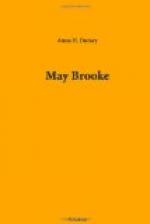Mr. Stillinghast had purchased the house some thirty years before, when it stood three quarters of a mile from the city. It was then a villa, and had been built by a French refugee, who, in those days of courtly customs, was famed for his elegant hospitality. One of the old noblesse, and but little acquainted with the practical management of business affairs, he became embarrassed, and was finally compelled to dispose of his elegant house and furniture, and retire to a life of obscurity and poverty. But the city was growing around it rapidly; in a few more years it would be hemmed in and walled around by streets and houses. Mr. Stillinghast fretted and chafed; then calculated its increased value, and grew almost savage at the idea that he would be dead and forgotten when heaps of gold would be paid down for the few feet of earth it covered.
When May went in, glowing with exercise and happiness, she found Helen moping over the grate, in which the fire was nearly extinguished.
“Why, Helen, it is very cold here, is it not?”
“I am nearly frozen.”
“Why on earth did you not step into the next room and get coal? There is a hod full on the hearth.”
“I am not in the habit of fetching coal and building fires,” she said, haughtily.
“And supposing that I was, I presume you waited for me,” said May, with a feeling of exasperation she could not control. Then laying off her bonnet and wrappings, she went out and brought in the hod, emptied it into the grate, let down the ashes, and put up the blower; and by the time she finished, the recollection of the fire which she had kindled that morning in old Mabel’s cottage came like a sweet memory into her heart, and the bitterness passed away.
“When do we dine? I suppose the ogre of the castle will be in soon!” said Helen.
“My uncle generally dines down town; and I beg, Helen, that you will speak more respectfully of him,” said May.
“And shall we get nothing until he comes?” screamed Helen.
“Yes,” said May, laughing at her cousin’s consternation. “We can dine now. I have some cold roast beef, bread and butter, and a pie, left from yesterday.”
“Oh, heavens! what a bill of fare; but let us have it, for I am famishing.”
“Before you get even that, my dear, you must help about a little. Here, spread the cloth, and cut the bread; I will do the rest.”
“Spread the cloth, and cut the bread! I don’t know how!”
“Learn,” said May, half diverted, half angry with the selfish one, as she handed her the tablecloth, which was put on one-sided, while the bread was cut in chunks. When May came in from the pantry, a butler’s room as it used to be in the time of the old marquis, Helen was crying over a bleeding finger, which she had cut in her awkward attempts to slice the bread.
“This is a bad business,” said May, binding it up. “Helen, I really feel very sorry for you. You will have so many disheartening trials in your new way of life; but keep a brave heart—I will learn you all that I know, if you are only willing.”




